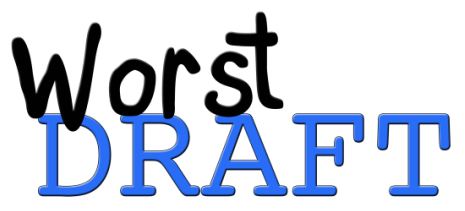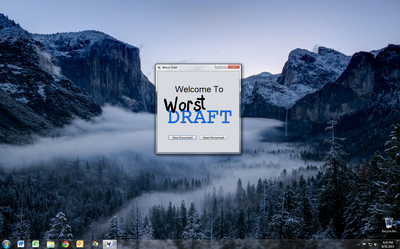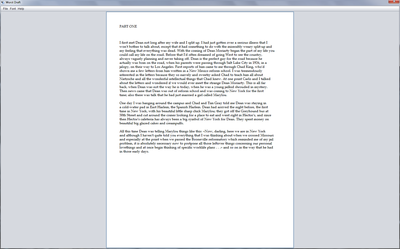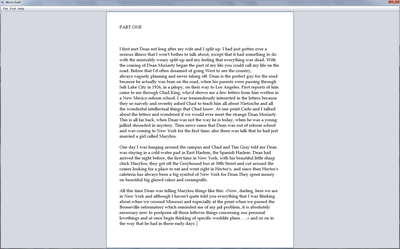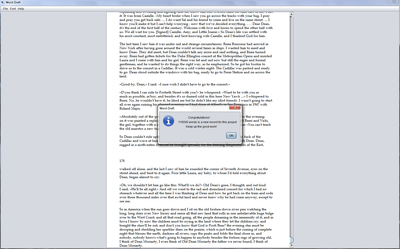Worst Draft is a minimalist word processor that removes the two biggest roadblocks for writers: editing & distractions. Users will be unable to delete anything more than a few most recently typed words, and they will also be unable to access any other applications without first closing Worst Draft.
By removing these elements the writer is forced to lean on his/her creative impulses to complete a first draft, postponing edits and research until future drafts.
By removing these elements the writer is forced to lean on his/her creative impulses to complete a first draft, postponing edits and research until future drafts.
Philosophy
While editing and research are important aspects of writing, too many writers end up tirelessly revising as they work. They see it as saving time when in reality they are just cutting corners by limiting the amount of imagination that goes into writing. Instead of creating a first draft that looks like a final draft, they end up with a final draft that looks like a first draft.
The truth is, when writing comes before editing:
1) Stories are more creative
2) Projects are completed faster
1) Stories are more creative
2) Projects are completed faster
When making a choice, always go with your first instinct—the one based solely on your gut feeling. Writers are faced with millions of choices during their first draft. Removing the ability to revise forces writers to leave logic at the door and go with their creative impulses to get the most imaginative first draft possible.
Proof
Veronica Roth’s Divergent took half as long to finish as her first manuscript because she stopped editing on the go.

“COMMIT. That means not even doubling back to check something. I mean it. If you forget a character’s name, who cares? Make up a new one and fix it later. (In fact, that’s REALLY easy to fix. Find/replace, anyone?) If you double back, even if it’s just for a few minutes, you will mess up your momentum.”
George R. R. Martin composed Game of Thrones entirely on WordStar 4.0, a DOS-based word processor invented in 1987.
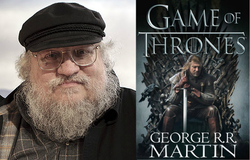
"I actually like it, it does everything I want a word processing program to do and it doesn't do anything else... I hate some of these modern systems where you type a lower case letter and it becomes a capital. I don't want a capital. If I wanted a capital, I would have typed a capital. I know how to work the shift key!”
Jonathan Franzen writes all of his books on an old laptop that is permanently disconnected from the internet.
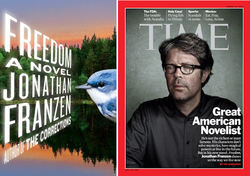
“I took the wireless card out immediately, and I plugged up the Ethernet hole with superglue... It’s doubtful that anyone with an internet connection at his workplace is writing good fiction.”
Jodi Picoult’s best advice to writers is to write no matter what. She practices this in her own work and claims to have worn the letters off two computer keyboards in doing so.
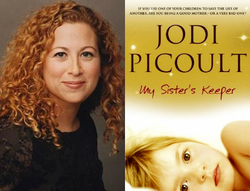
“When you finally start to write something, do not let yourself stop…even when you are convinced it’s the worst garbage ever. This is the biggest caveat for beginning writers. Instead, force yourself to finish what you began, and THEN go back and edit it. If you keep scrapping your beginnings, however, you’ll never know if you can reach an end.”
John Steinbeck broke his writing up into small pieces, and he always pushed ahead.
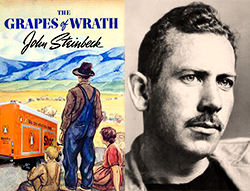
"Write freely and as rapidly as possible and throw the whole thing on paper. Never correct or rewrite until the whole thing is down. Rewrite in process is usually found to be an excuse for not going on. It also interferes with flow and rhythm which can only come from a kind of unconscious association with the material."
Aaron Sorkin waits to sketch out a character's backstory until he needs that history to drive the plot.
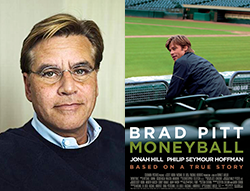
"I keep writing and I keep writing; what I try to do at the beginning is just get to the end. Once I've gotten to the end, I know a lot more about the piece, and I'm able to go back to the beginning and touch stuff that never turned into anything, and highlight things that are going to become important later on."
